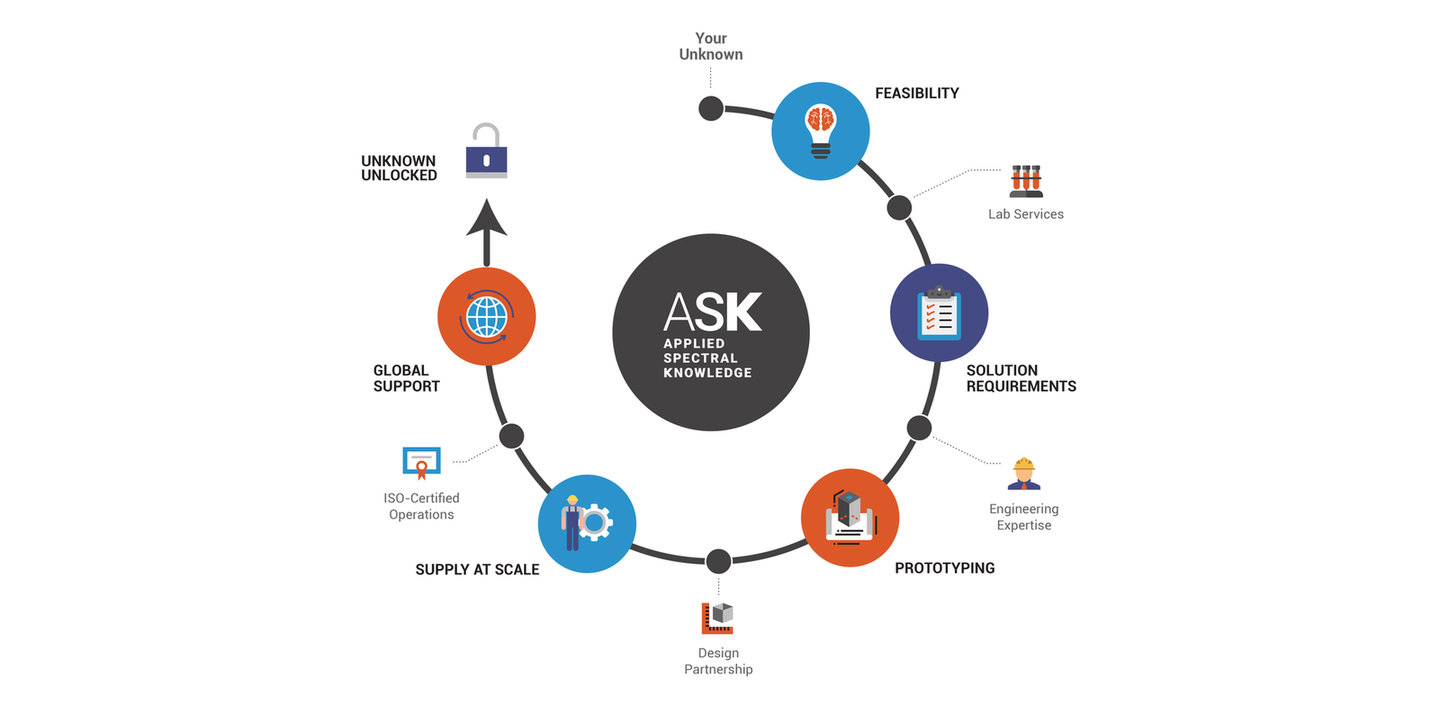COMPANY
INSIGHT
Applied Spectral Knowledge for a Healthier World
From health issues associated with aging populations to demand for faster, more accurate diagnostic tools, medical technology professionals require analytical instrumentation and application insight that are simpler, smarter and more robust than traditional tools and approaches. Ocean Insight delivers optical sensing innovations and technical know-how to meet evolving needs in medical diagnostics.
Applying optical sensing techniques like spectroscopy to biomedical and life sciences challenges requires a carefully considered combination of scalable hardware, application know-how and algorithm development. Ocean Insight partners with customers in applying spectral knowledge to solve diagnostic and monitoring challenges. We offer a line of compact spectroscopy products, multispectral sensing solutions and software/algorithm development for applications in biomedical diagnostics, applied biotechnology and life sciences, research and science, and industrial processing.
Solutions for Medical Technology
The Ocean Insight integrated approach to customer needs – we call it Applied Spectral Knowledge (ASK) – is a combination of innovative spectroscopy hardware, software and on-demand data delivery, backed by deep category expertise.
ASKties our strength in product design and development with in-house, cross-functional, category-specific expertise. By drawing from disciplines including systems and software development; optical, mechanical and electrical engineering; and industrial design we’ve assembled the capacity to provide intensive customer collaboration on highly precise challenges across many industries.

Applied Spectral Knowledge and Medical Technology
Here are two examples of ASK at work in the medical and life sciences sector:
Facilitating Cataract Diagnosis to Reduce Preventable Blindness Worldwide
Ocean Insight and a European research team collaborated to investigate faster, simpler diagnostic tools with the capacity to improve eyecare for millions of people.
Cataract is a major cause of blindness, affecting 95 million people worldwide. Even as cataract treatment has become safer and simpler to perform, people with limited or no access to proper eyecare will suffer preventable blindness and visual impairment.
Existing cataract diagnostics involve the use of slit-lamp instrumentation, which allows eyecare professionals (ECPs) to see the eye lens under magnification and then compare those visuals with 3D photographs of the eye. Although this method is safe and effective, the development of simpler, faster, more portable diagnostic tools could reach even more patients in need.
Most cataracts result from a chemical reaction between sugars in the body and proteins in the eye lens – a process called glycation -- that occur over time. Optical sensing instruments are well suited to measure biochemical processes such as glycation in patients rapidly and noninvasively, in real time.
Eye lens tissue will fluoresce when briefly illuminated with UV light, with cloudy and normal lenses producing different spectral signatures. Ocean Insight provided the researchers with an affordable, simple to use and flexible spectroscopy system to safely and reliably assess glycation in patients. Quantitative measurements can be performed easily and within seconds, with results available immediately.
Cataract Diagnosis case study
Improving Diagnostic Accuracy to Revolutionize Wound Care
Ocean Insight and Spectral MD (Dallas, Texas) collaborated to develop noninvasive diagnostic technology using multispectral imaging technology to improve outcomes for patients with serious wounds.
Nearly 6.5 million patients in the U.S. suffer chronic wounds from causes such as burns, infections and complications from diabetes. The U.S. healthcare system spends $25 billion each year on treating wound-related complications.
Today, physicians use clinical judgment to assess the depth and severity of a burn or infection, or must use invasive diagnostic tests that require biopsy. Studies show that even expert burn care specialists will mischaracterize burn depth 30% of the time. Non-specialists have an even higher error rate.
Ocean Insight partnered with Spectral MD, a medical device developer, to create non-invasive diagnostic tools that allow clinicians to look deep into the body for wound management, burn analysis and assessment of chronic conditions such as diabetic ulcers and peripheral vascular disease. Spectral MD’s DeepView® Wound Imaging System uses Ocean’s SpectroCam multispectral camera to look deep into the body non-invasively, and without the use of radiation or lasers.
The Spectral MD system begins its diagnostics by sending various wavelengths of light into the body. Ocean Insight’s multispectral sensing camera then turns those wavelengths into pixel images, helping to map blood flow and tissue viability.
The revolutionary DeepView wound imaging system has the power to lower health care costs and reduce pain and suffering in thousands of patients every year. Multispectral imaging will continue to play a larger role in diagnostics and patient care. Compared with visual inspection and traditional imaging, multispectral imaging has the power to better discriminate between healthy and diseased conditions.
Wound Care case study